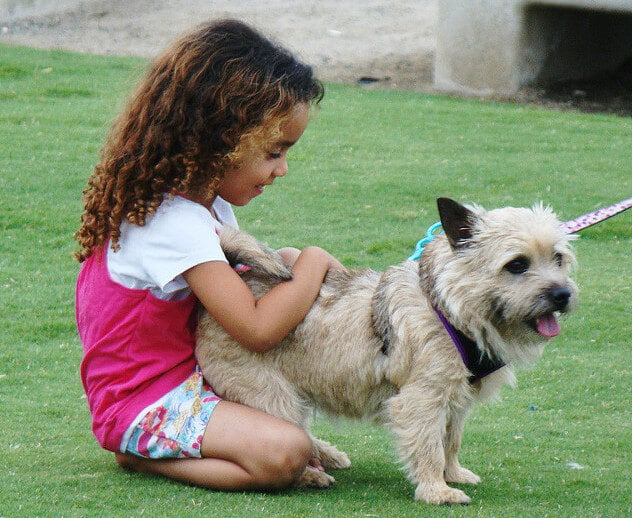Your furry, four-legged friend may be doing more good than you thought. A new study shows that pet dogs help reduce levels of stress in children.
That’s welcome news for many children and parents around the country, because about 40 percent of families with young kids have a dog. While those numbers support the dog’s position as a much-loved member of the family, scientific research has been light on making the case with real, hard data.

With the new study, researchers from the University of Florida have given dog owners a reason to reward their pups with an extra treat or two.
“Many people think pet dogs are great for kids but scientists aren’t sure if that’s true or how it happens,” said study author Darlene Kertes, an assistant professor in the Psychology department at the University of Florida.
For the study, researchers intentionally placed children between the ages of 7 and 12 into stressful situations, such as public speaking and having to solve difficult arithmetic problems. Then they paired some of the children with their dog, while other children had a parent present. A third group of children had to perform the tasks alone.
The researchers wanted to compare how different social supports — or none at all — affected levels of cortisol, a stress hormone, in the children. After testing the children’s cortisol levels with saliva samples, the researchers discovered that the group of children with dogs present had a positive reaction — even better than having a parent there.
Related: Your Household Pet Could Keep Your Child Healthy

“Our research shows that having a pet dog present when a child is undergoing a stressful experience lowers how much children feel stressed out,” Kertes said. “Children who had their pet dog with them reported feeling less stressed compared to having a parent for social support or having no social support.”
The researchers also found that the way in which the children interacted with their pet dogs led to divergent results.
“Children who actively solicited their dogs to come and be pet or stroked had lower cortisol levels compared to children who engaged their dogs less,” said Kertes. “When dogs hovered around or approached children on their own, however, children’s cortisol tended to be higher.”

The results are leading researchers to believe that dogs can play an important role in helping children mature. Other studies have shown that canines can help kids improve their “autonomy, self-concept and empathy.”
“Middle childhood is a time when children’s social support figures are expanding beyond their parents, but their emotional and biological capacities to deal with stress are still maturing,” said Kertes. “Because we know that learning to deal with stress in childhood has lifelong consequences for emotional health and well-being, we need to better understand what works to buffer those stress responses early in life.”
The next time you want to send your pooch to the doghouse, you may want to think twice. It appears your dog is doing some nifty character-building work behind the scenes.
“How we learn to deal with stress as children has lifelong consequences for how we cope with stress as adults,” said Kertes.
Related: The Role Pets Play in Managing Our Mental Health
Richard Scott is a health care reporter focusing on health policy and public health. Richard keeps tabs on national health trends from his Philadelphia location and is an active member of the Association of Health Care Journalists.


![How To: ‘Fix’ Crepey Skin [Watch]](https://cdn.vitalupdates.com/wp-content/uploads/2017/05/bhmdad.png)












